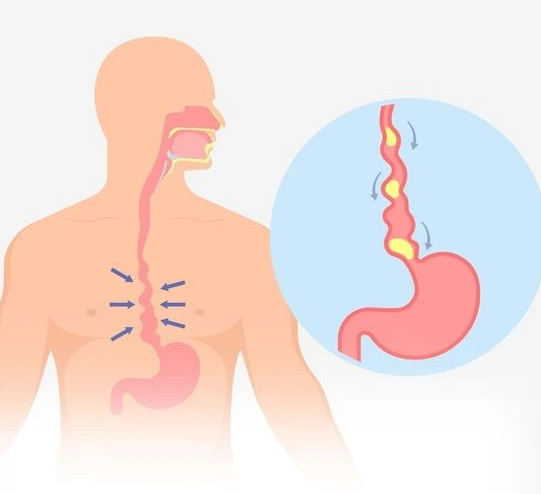
Esophageal Ulcer
An esophageal ulcer is a sore or lesion that develops in the lining of the esophagus, which is the tube that connects the throat to the stomach. Esophageal ulcers can be painful and can cause difficulty in swallowing, and they are typically caused by long-term acid reflux.
There are two main types of esophageal ulcers:
1.Peptic Ulcer: This type of ulcer is caused by stomach acid that flows back into the esophagus. Peptic ulcers are often associated with gastroesophageal reflux disease (GERD) and can cause pain or burning in the chest area.
2.Infectious Ulcer: This type of ulcer is caused by an infection, usually with a bacteria called Helicobacter pylori. Infectious ulcers are less common than peptic ulcers.
Symptoms
Some common symptoms of esophageal ulcer include:
- Pain or discomfort in the chest or upper abdomen.
- Difficulty in swallowing
- Nausea or vomiting
- Indigestion or heartburn
- Weight loss: If the ulcer is severe or long-lasting, it can cause weight loss due to difficulty in eating or absorption of nutrients.
- Blood in vomit or stool: In some cases, an esophageal ulcer can lead to bleeding, which can result in the presence of blood in vomit or stool.
Causes
The most common cause of esophageal ulcers is gastroesophageal reflux disease (GERD). However, other factors may contribute to the development of an esophageal ulcer, including:
- Helicobacter pylori, a type of bacteria that can cause stomach ulcers, has also been linked to esophageal ulcers.
- Certain medications can increase the risk of developing esophageal ulcers.
- Smoking
- Heavy alcohol consumption
- Radiation therapy to the chest or neck
- Swallowing of corrosive substances
- Genetic factors

Diagnosis & Treatment
Diagnosis of an esophageal ulcer typically involves a combination of medical history, physical examination, and diagnostic tests. an endoscopy to examine the inside of the esophagus and stomach and look for signs of ulceration may be performed. During the endoscopy, a biopsy may also be taken to check for signs of infection or other underlying conditions.
The main goals of treatment are to reduce pain, promote healing of the ulcer, and prevent complications.
- Medications: Depending on the cause of the ulcer, medications may be prescribed to treat the underlying condition and reduce stomach acid production.
- Antibiotics: If the ulcer is caused by a bacterial infection, antibiotics may be prescribed to eliminate the bacteria.
- Surgery: In rare cases, surgery may be necessary to treat an esophageal ulcer that is not responding to other treatments or has caused serious complications like perforation.
- Lifestyle changes: Making changes to your lifestyle can help reduce the risk of developing an esophageal ulcer and prevent symptoms from worsening.
- Avoidance of irritants: Avoiding certain medications like NSAIDs, aspirin, and bisphosphonates that can increase the risk of developing esophageal ulcers.
- Nutritional support: In some cases, nutritional support may be necessary to help promote healing of the ulcer and prevent weight loss.
What to expect after treatment
After treatment for an esophageal ulcer, the symptoms should start to improve within a few days to a few weeks
1.Relief of symptoms: As the ulcer heals, you should notice a reduction in symptoms like chest pain, difficulty swallowing, and heartburn.
2.Follow-up appointments: Your doctor may recommend regular follow-up appointments to monitor the healing of the ulcer and adjust treatment as necessary.
3.Lifestyle modifications: To prevent the recurrence of the ulcer or the development of new ulcers, your doctor may recommend making lifestyle modifications like quitting smoking, avoiding certain foods, and reducing alcohol consumption.
4.Medications: Depending on the cause of the ulcer, your doctor may prescribe medications like PPIs or H2 blockers to reduce acid production and promote healing.
5.Nutritional support: If you have experienced significant weight loss due to the ulcer, your doctor may recommend nutritional support to help you regain lost weight and prevent malnutrition.
6.Prevention of complications: In some cases, an esophageal ulcer can lead to serious complications like bleeding, perforation, or strictures (narrowing of the esophagus). Your doctor will monitor you closely to prevent these complications from occurring.

